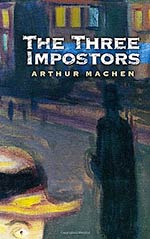
![]() charlesdee
charlesdee
12/4/2016
![]()
When Arthur Machen's The Three Imposters was headed to press, John Murray, his London publisher, got cold feet. The year was 1895;the scandal of the Oscar Wilde trial was still fresh in the public's mind; and, Murray worried that Machen's depiction of pagan cults devoted to sex and murder might run afoul of the censors. He requested cuts. Machen reportedly changed one word. The book was published without incident.
Reading it today it is hard to imagine what the fuss would have been about. But Machen was known as a decadent writer. (I have unread on my kindle a 1918 appreciation of the author titled, Arthur Machen: Author of Ecstasy and Sin.) His most famous short story, "The Great God Pan", is as kinky as it is off-putting in its presumption of male and class privilege. And the three imposters in this series of linked short stories are, once you can untangle the convoluted narratives, involved in some pretty horrible stuff.
But it is the sort of horrible stuff that now dominates horror programming on cable TV. Machen's depictions of grotesque horror are images that, if I caught them on a Saturday afternoon Chiller Channel viewing session, I might note in passing looked pretty cool. They make for entertainment that is "of its day" rather than "dated."
Machen's love of London and its streets, alleyways, bachelor flats, and even its suburbs add much to his tales. And there is some genuine comedy in his choice of characters, diletantish young men of sufficient if limited means who remain clueless of the world they have stumbled into until the final gory revelation.
"My dear sir," said Dyson, "I will give you the task of the literary man in a phrase. He has got to do simply this--to invent a wonderful story, and to tell it in a wonderful manner."
Mr. Dyson is speaking for the author at this moment, but he is also setting himself up for some terrible shocks.